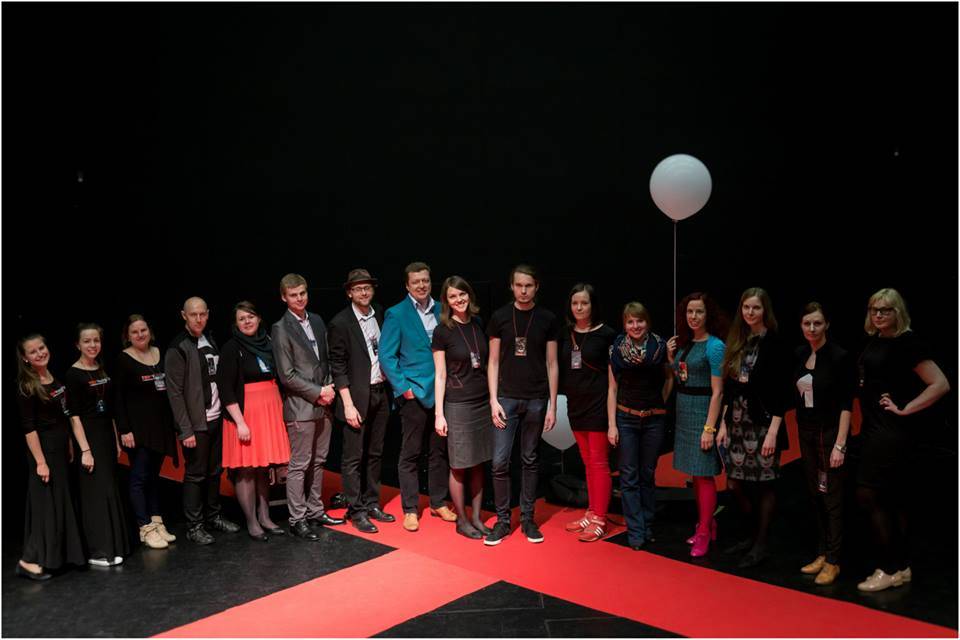“Embrace only what touches your soul!” Paraphrasing the Estonian classic, Eva Koff urges us to find our true nature – one, which can only be beautiful
The event was tied up by the writer, translator and teacher, Eva Koff, whose sincere and insightful speech put all the previous talks into perspective. According to Eva, the talks and inventions introduced at TEDxTallinn couldn’t have happened if these people weren’t in touch with their true selves, ie their inner child.

Breaking down the rooted dualism of a child-adult, she makes way for a new approach that could alter the future of young Estonians towards becoming more wholesome, emphatic and happy people. Far from the simpleton view of kids, the five-year-old hero of “Seitsmes Rahukevad” (“The Seventh Spring of Peace”, a novel by Estonian writer Viivi Luik) tackles major life issues early on. Presenting what is, in her mind, the most powerful child character in Estonian literature, she blurs the line between the child and adulthood. Eva believes that the first is actually something perceived.
Every epoch creates its own unique childhood. The 21th century pre-pubescence is different from what it used to be 50 years ago:
– Childhood of a European kid is long. One could say it takes up to when s/he finishes high school at around 19 years old.
– Parents value fast growth for the child, so they seek new and better conditions for development. That means putting them in the hands of professionals and inevitably distancing them.
– Boredom doesn’t play a role during the early life anymore. There are no idle, empty moments anymore, and that means there’s no place for chance and spontaneous moments where new ideas can manifest.
“Do you still remember those pre-internet moments of boredom where you had no idea what’s going to happen? There was an emptiness which left room for something to arise – a new game, a new thought; a new dream could be born.”
– The relationship between the child and the parent has changed. In spite of the fast lifestyle, there are a lot of parents who are closer to their children than ever. Communication takes place among equals, and more substantial topics are discussed. The hierarchy of a family has weakened, and its role isn’t as fixed anymore.
Koff emphasises the importance of analysing today’s childhood. If we can see the conditions kids grow up in, then we can see what they are missing in all this abundance. Perhaps the most profound truth that goes missing when daily routines and work takes over is a simple one:
“Keep in touch with your own inner child.”
“Sounds like cliché and a beautiful thought,” Koff says, “but do we really engage with our inner child?” It seems that it loses significance as we grow farther from it while getting older. “Love, empathy, commitment, feeling the holy, creation, work that has real value to us – I feel that all the real things in life go through this original self.
“We could think of the inner child as a place as well, a pure room that’s inherent in every human being.”
“If it were physical, it wouldn’t fit the body. Surely, there are no social games, hierarchies, positions that you have to fight for in a society, no lies or half-truths. There are no willingly created constructs, presented as real life, which break apart as soon as they meet what’s true.”
What’s in this pure space then? “Everything that’s real,” says Eva, “and that which is real is the only thing that’s valuable. The space lies so deep in us that we can’t and shouldn’t connect with it every step of the way. Rather there are moments where we can, and we should use those moments.” She references Inna Lai’s beautiful chime play and points out that listening to music could be one of those moments: “It could also be some person, nature or times we give significant meaning. It is of utmost importance that we recognise these moments and don’t let them slip by. When we use these moments we can get in touch with the inner child, and if we can apprehend our own inner being then we can see it better in our own children, we’ll know what is real for our kid, and we can accompany them with the best for life.”
Why is that important? She proceeds to lay a fundamental truth on everybody: if we know who we really are, we can make the best choices in life. We can choose the right calling, the profession which calls us. That will make sure we don’t work on the wrong field.


This is pure joy to read! Thank You, Henrik!
Thank You for the kudos, Oliver!
very enjoyable reading……………..